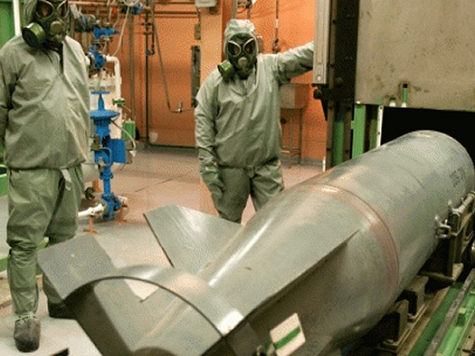
This morning’s key headlines from GenerationalDynamics.com
- S. Korea sets deadline for N. Korea on Kaesong Industrial Complex
- U.S. says Syria has used chemical weapons twice
- China’s Uighur violence may be related to East Turkestan Islamic Movement
- U.N. Security Council approves 12,600 person force for Mali
S. Korea sets deadline for N. Korea on Kaesong Industrial Complex

Kaesong industrial complex
The Kaesong industrial park is in North Korea, just across the borderfrom South Korea. It was created in 2004 as a point of cooperationbetween the two Koreas. Until a month ago, it provided jobs for morethan 5e,000 North Koreans, and over 1,000 South Koreans, many of whomcross the border each day to work there. The employers are SouthKorean manufacturing firms, mostly textiles. Each North Korean earnsaround $70 per month, though a larger amount is paid to the NorthKorean government, making Kaesong a major source of income.
Operations in Kaesong halted on April 9, when the North Koreans pulledout all 53,000 of its workers, as part of its circus-like dailythreats of war. But now the South Koreans are saying that it’s timeto end the circus show, and demanding that the North “discuss ways ofnormalizing operations at Kaesong” by Friday. If the offer isrejected, then the South will take “serious measures,” possiblyshutting Kaesong down for good. Yonhap (Seoul)
U.S. says Syria has used chemical weapons twice
The White House and top U.S. administration officials said on Thursdaythat U.S. intelligence has concluded “with some degree of varyingconfidence” that the Syrian government has twice used chemical weaponsagainst the opposition. Republican Senator John McCain is insistingthat President Barack Obama should now honor his commitment thatuse of chemical weapons would be a “game changer” and wouldcross a “red line” that would trigger military intervention inSyria. However, U.S. officials are now saying that more definitiveproof was needed before there could be military action. One issueis that if the U.S. launched a military intervention based onintelligence estimates, then the announcement would be met withwidespread scorn. AP
China’s Uighur violence may be related to East Turkestan Islamic Movement
The ethnic violence between Uighurs and Han Chinese in China’sXinjiang province in northwestern China that we reported yesterday is being described byChinese authorities as the acts of a small group of thugs. However,it seems far more likely that there two major underlying causes:
- In recent decades, Xinjiang province has seen a big influx of Han Chinese, brought into the region to exploit the natural resources and to dilute the Uighur population. (China uses the same policy with the Tibetans in Tibet province.) China’s government is extremely oppressive towards the Uighurs, but they don’t speak out because of fear.
- Although no one has been formally accused in Tuesday’s attack, the al-Qaeda linked East Turkestan Islamic Movement has been accused in the past of fomenting a separatist movement among Uighur communities in central Asia.
Chinese media are claiming that the United States holds a “doublestandard” when it comes to terrorism in the United States and inChina. According to one Chinese professor:
“However, the West has been holding double standardsin the definition of terrorism. If the East Turkestan separatistscarry out evil deeds in Xinjiang, some Western opinions whitewashthem as seeking ‘national self-determination'”
The Chinese point out that the U.S. was quick to blame separatistsfrom Chechnya for the Boston marathon bombings, but sympathizes withUighur separatists who commit terrorism in Xinjiang. VOA and BBC
U.N. Security Council approves 12,600 person force for Mali
The United Nations Security Council on Thursday voted unanimously toapprove a peacekeeping force for Mali, consisting of 11,200 troops and1,440 police. Though the French-led intervention initially succeededin driving the al-Qaeda linked militias from the towns and citiesonce under their control, a series of several attacks, includingsuicide bombings, in Mali’s northern cities raise the question ofwhether the Islamist forces have really been defeated. CS Monitor
Permanent web link to this article
Receive daily World View columns by e-mail

COMMENTS
Please let us know if you're having issues with commenting.